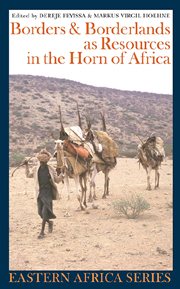Book contents
- Frontmatter
- Contents
- List of Maps, Tables & Charts
- Preface by Günther Schlee
- Editors' Preface
- Notes on Contributors
- List of Acronyms
- 1 State Borders & Borderlands as Resources
- 2 More State than the State?
- 3 Making Use of Kin beyond the International Border
- 4 The Tigrinnya-speakers across the Borders
- 5 Trans-Border Political Alliance in the Horn of Africa
- 6 People & Politics along & across the Somaliland-Puntland Border
- 7 The Ethiopian-British Somaliland Boundary
- 8 The Opportunistic Economies of the Kenya-Somali Borderland in Historical Perspective
- 9 Magendo & Survivalism
- 10 Can Boundaries not Border on One Another?
- 11 Conclusion
- Index
- EASTERN AFRICAN STUDIES
4 - The Tigrinnya-speakers across the Borders
Discourses of Unity & Separation in Ethnohistorical Context
Published online by Cambridge University Press: 05 April 2013
- Frontmatter
- Contents
- List of Maps, Tables & Charts
- Preface by Günther Schlee
- Editors' Preface
- Notes on Contributors
- List of Acronyms
- 1 State Borders & Borderlands as Resources
- 2 More State than the State?
- 3 Making Use of Kin beyond the International Border
- 4 The Tigrinnya-speakers across the Borders
- 5 Trans-Border Political Alliance in the Horn of Africa
- 6 People & Politics along & across the Somaliland-Puntland Border
- 7 The Ethiopian-British Somaliland Boundary
- 8 The Opportunistic Economies of the Kenya-Somali Borderland in Historical Perspective
- 9 Magendo & Survivalism
- 10 Can Boundaries not Border on One Another?
- 11 Conclusion
- Index
- EASTERN AFRICAN STUDIES
Summary
Imagine there's no countries. /It isn't hard to do /Nothing to kill or die for
(John Lennon)Introduction
The Tigrinnya-speakers discussed in this chapter are the dominant group of the state of Eritrea, independent from Ethiopia since 1993 (de facto since 1991), and also form the predominant majority in the northern Ethiopian Regional State of Tigray, just south of the Eritrean border. Thus, today a state border that became a war border in 1998 separates Tigrinnyaspeakers into two halves. With the help of ethnonyms and ethnohistorical examples, it is shown in this chapter that the establishment, reinforcement and weakening of boundaries were and are integral parts of Tigrinnya history and of today's political reality. Boundaries separating Tigrinnya subgroups from each other were and are marked by changes of discourse, following both ancient subgroups’ identities and actual political-dynastic interests. Discourses have often made pre-existing boundaries more visible – or created some anew – and caused others to disappear from view, while often persisting at a lower level of discourse and socio-economic practice to be possibly revived later on.
The chapter shows that boundaries are nothing artificial for Tigrinnyaspeakers, but rather are a typical heritage of this large ethno-regional group composed of many sub-groups. These sub-groups are marked by a tendency both towards regionalism and at times towards feelings of unity encompassing virtually all Tigrinnya-speakers. While the existence of boundaries is nothing new, the existence of a state boundary has added a new quality, the consequences of which are not yet fully foreseeable.
- Type
- Chapter
- Information
- Publisher: Boydell & BrewerPrint publication year: 2010



